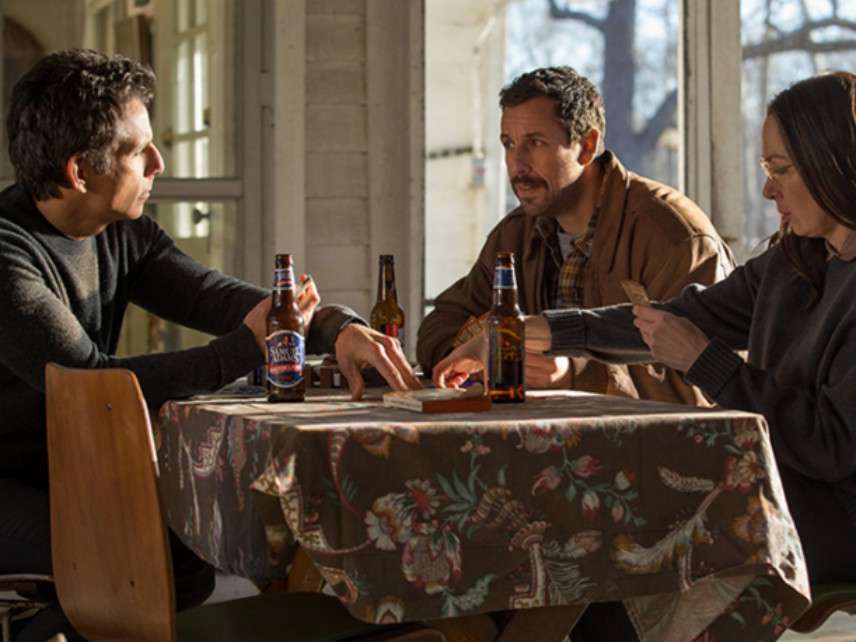Movie Review: The Meyerowitz Stories (New and Selected)
Ben Stiller, Dustin Hoffman, and Adam Sandler at a career peak.

This is not your father's Woody Allen movie. In The Meyerowitz Stories (New and Selected), writer-director Noah Baumbach surveys vintage Allen territory—the artsy highlands of New York's Jewish upper middle class—and finds new comic moves to try, new kinds of laughs to mine. Dustin Hoffman contributes a deadpan comic turn that's pure old-pro, Ben Stiller is seriously good, and Adam Sandler gives the most moving performance of his career. Yes, Adam Sandler.
Hoffman's Harold Meyerowitz is a retired sculptor who's been eclipsed in old age by his longtime rival, L.J. Shapiro (Judd Hirsch, also in old-pro mode, however briefly). Harold, who maintains the dramatically swept-back hair of a lion-of-the-arts, is annoyed by this fact, and is thus even more annoying than ever to his three middle-aged children: Danny (Sandler), a failed musician now returned to his father's house following a divorce; Jean (Elizabeth Marvel), a mousy drudge who has stifled her sizable sorrows for decades; and Matthew (Ben Stiller), Danny and Jean's half brother, who hopped off the exhausting family hamster wheel years ago to move to Los Angeles and become a very successful business manager.
Baumbach (Frances Ha and the must-see While We're Young) gets right to work introducing these and various satellite characters with crisp dialogue and an editing style so sharp it sometimes cuts off the actors' lines in mid-sentence. He whips things along with admirable economy.
We ride through downtown Manhattan with Danny and his college-bound daughter Eliza (Grace Van Patten, in breakthrough mode), with Danny pointing out the long-gone venues of his '80s youth. (That used to be the fabled Danceteria, he tells Eliza; now it's just another building.) Danny's trying to take an upbeat view of his forced return to the family home: maybe now he and his father can have that together time that never seemed to materialize during Danny's childhood, when he really needed it.
Arriving at Dad's house, they're glumly greeted by the downbeat Jean ("Thanks for being late"), and by Harold's current wife Maureen (Emma Thompson), a slurry drinker and terrible cook. Harold doesn't greet them because he doesn't really talk to anyone—he talks past people, not caring how they respond or how much his words might hurt. (To the loyal and loving Danny: "You've essentially never worked in your life.")
Before long, Matthew arrives, fresh off a redeye from LA. He's in town to consult with a client (Adam Driver, don't blink) and to break the news to Harold that his financial situation is dire, and will require painful adjustments. It's like talking to a wall. Matthew thinks he's past being driven crazy by the old man, but after a disastrous (hilarious) lunch, he realizes he is, in fact, being driven crazy. ("I see you and I get suckered into your shit all over again!") Things could be worse, though: Matthew and his whipped-puppy brother could have wound up like Jean, who has no real life and no prospects for one. In a poignant scene set in a copse of woods, Jean tells her brothers a disturbing story from her childhood that she's never shared before. "You guys will never realize what it's like to be me in this family," she says.
The movie is structured as a series of "stories," one for each of the now-grown siblings. These narrative chapters shift around in time. (Two similar-looking hospital sequences turn out to be unrelated.) We also witness a very funny meltdown at a MoMA art show and brief snippets of video brought back from school by Eliza, an aspiring filmmaker. (Her work, featuring herself, is heavy on nudity and absurdist humping, and it seems to be a little joke on Baumbach's part that none of the ultra-broad-minded family members watching this footage—including Eliza's father—would dare to utter a discouraging word.)
For a movie that consists mostly of talk, in the Woody Allen style, The Meyerowitz Stories is lively throughout, its humor firmly rooted in the characters' inclinations. At the end, the pictures settles into a well of deep feeling that's so emotionally eloquent you might reconsider your previous estimation of some of the key performers—Sandler not least among them.


Show Comments (11)